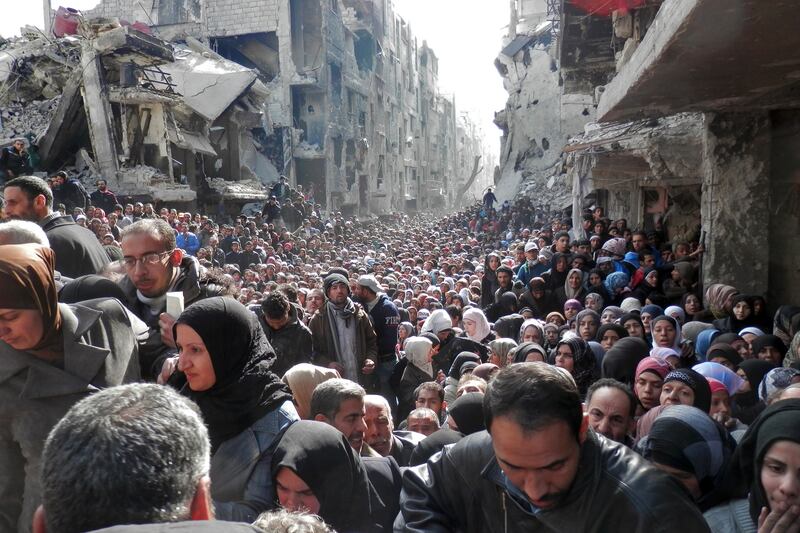The aid situation in Syria—which has been dire ever since the start of the civil war—reached a desperate new low in May, with reports of government forces starving the residents of Homs to force a ceasefire, and with the NGO Mercy Corps revealing last week that the Assad regime had kicked its workers out of Damascus in retaliation for the group’s work in rebel-controlled areas. The United Nations has also publicly admitted that it has been threatened with imminent expulsion from the capital if it seeks to deliver aid elsewhere in the war-torn country.

Cassandra Nelson, a director at Mercy Corps, told The Daily Beast that the group left the country’s capital “following a request from Syrian government authorities to stop delivering humanitarian assistance from across borders into non-government-controlled territory inside Syria. Syrian government authorities informed Mercy Corps it could no longer operate from Damascus if it did not cease these operations.”
The NGO chose to leave Damascus rather than abandon its program in Aleppo, where it supports 1.7 million Syrians by delivering “flour to bakeries to make sure families have access to daily bread,” said Nelson, as well as “providing blankets, clothing, winter survival kits, hygiene items, water and sanitation supplies.”
ADVERTISEMENT
In announcing its expulsion, Mercy Corps became the first international NGO to break its silence on the size and scale of operations in northern Syria. Most aid groups remain silent about their work for fear of jeopardizing their ability to operate in government-held areas like Damascus. Over the course of the conflict, now in its fourth year, NGOs have been operating in the north of the country under a veil of secrecy, walking the fine line of competing political and operational issues to ensure their ability to deliver aid to some of the 9 million people in desperate need inside Syria. At least 30 international NGOs are operating in the north of Syria in this way, according to Dominic Bowen, coordinator of the NGO Forum in Gaziantep.
The culture of silence around the operations in the north has made the assessment and monitoring of humanitarian need, as well as coordination and vital fundraising, difficult for the NGOs working in the area. The NGO Forum was set up in part to address gaps in the humanitarian response, normally implemented by the United Nations.
The United Nations has found its hands tied in terms of providing humanitarian relief inside Syria. On Thursday, the U.N. Security Council is set to meet to discuss the lack of progress on Resolution 2139, which sought to allow humanitarian access to all those in need in Syria’s conflict. The resolution, passed in February, required all warring parties to allow humanitarian groups to administer aid across front lines and borders. But U.N. Secretary General Ban Ki-Moon recently released a report that painted a sorry picture of noncompliance. “Parties to the conflict, particularly the government of Syria, continue to deny access for humanitarian assistance in a completely arbitrary and unjustifiable manner,” he said, urging the Security Council to “take action to deal with these flagrant violations of the basic principles of international law.”
The spokesperson for the UK mission to the U.N. told The Daily Beast that the violations are “unacceptaable,” adding, “it has become clear that we will need to take further action in response to the lack of compliance from Syria.” Two sources from UNSC member states confirmed that further action on the part of the council was imminent.
But this fiery rhetoric seems unlikely to translate into immediate action. A spokesperson for the U.N. said the aid effort was “more difficult than any other conflict” and that “the needs are much, much bigger than we are able to do.”
In a classified United Nations report on cross-border aid obtained by the Daily Beast, the U.N.’s primary strategy seems to be the continuation of the status quo. The report, written in April, looks at possible options for cross-border aid supply work, but, in the absence of government approval for the use of border crossings in the north, seems content to allow NGOs currently working in the area to continue their work with additional facilitation by the United Nations where possible, such as in lobbying for border gate access through additional diplomacy.
The report also reveals the lack of equivalence between access issues in government-held areas of the country and in rebel-held areas, stating that many of the larger rebel groups holding territory in Aleppo and Idlib governorates have a track record of cooperation with humanitarian aid efforts.
Some small shipments of aid have recently been allowed into Syria. A U.N. spokesperson said that 73 cross-line missions have been undertaken throughout the conflict, including one last week by the ICRC, which operates exclusively in government-controlled areas of the country. The ICRC also managed to deliver aid into ISIS-controlled areas in the northeast of the country on a Syrian government-approved mission in coordination with the Syrian Arab Red Crescent. Publicity by the groups suggested the areas of Manbij and Al-bab had not received aid for nine months, a claim that was disputed by a member of an NGO operating in the north who has been delivering to these cities but who did not wish to be named.
Aid has been highly politicized within the conflict. The government’s “siege and starve” campaign in areas like old Homs and the Ghouta and Yarmouk camps has collectively punished rebel-held areas for their allegiance to the opposition. In Yarmouk camp, dozens of residents have died and, despite the U.N. resolution, the UNRWA has been unable to provide food aid to the besieged camp on a regular basis. UNRWA spokesperson Christopher Gunness said the U.N. remains deeply concerned about the desperate humanitarian situation of the estimated 18,000 civilians trapped in Yarmouk, with no end in sight to Syria’s bloody conflict.





